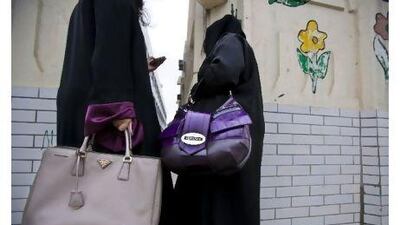The article Young Emiratis spending on luxury items and building up debt (April 1) made good observations and as such, I read it with disappointment. It is sad that many people are willing to go into debt in order to make themselves look like part of a social elite.
Sometimes I wonder what goes on in their heads when they take out loans to buy luxurious items. Do they think that having these items or that membership in an elite group will somehow help them pay off their debts?
We need people to understand that not having flashy cars, high-end handbags and other items that are overpriced as well as overrated does not mean that you are a nobody. Being rich is not the same as looking rich. When you spend more than you earn, you will end up being owned by either the bank or the bigger cellmate in jail.
Sultan al Darmaki, Dubai
China won't be a gunboat diplomat
The article China lacks focus in the Middle East (April 1) was a very refreshing take on what most US analysts write based upon a misled sense of optimism as to US power. The analysis is great, but the recommendations seem out of place.
China need not become a gunboat diplomat like colonial western powers. In fact, its stunning success since the 1990s in Africa, when it was ignored by the West after installing pliant dictatorships in the 1960s and 1970s, and lately in Latin American markets, testifies to its wise projection of soft power and neutral approach unless its own vital interests are at stake.
Why be in a hurry to occupy when long term relationships have borne tremendous market gains, and could lead to more in the region with continuing investment and trade policies, as opposed to political and military interference?
China has its own long history of colonisation, from the destruction of the Summer Palace through the Boxer Rebellion to Nanjing and more. It would be foolhardy to suggest, as our author surmises, that a peaceful gain ought to be irrationally upset by military manoeuvres just as such policies have made US-led coalitions relive the ghosts of Vietnam all over.
War is costly: just ask Britain whose empire collapsed under debt from the Second World War; even though Germany was defeated at the time.
Athar Mian, Abu Dhabi
Obstructive road planning
Prevention is better than cure with regard to Urban hazards are unnecessary risk (March 23). If there is a desire to reduce the incidence of pedestrian accidents in Abu Dhabi, some basic rules need to be applied.
There are several pedestrian crossings at junctions where the driver's view is totally obstructed by the Municipality's rubbish bins. I have observed two near misses at one of these junctions. Both involved children! Something needs to be done to rectify this potentially fatal error.
Jeremy P Weeks, Abu Dhabi
Aussie case gives rise to bigotry
Whilst I deplore what happened to Alicia Gali, a fellow Aussie, my sympathy has been vastly reduced by a growing tendency to extrapolate more from the incident Hotel defends claim it failed to protect staffer in rape case (March 31). I base this on a spate of articles that have recently been published in Australian newspapers.
One essentially lays the blame on the UAE and goes on to mention the recent launch of the Etihad-Virgin alliance and the sponsorship of sporting events. Then there are a series of the most vile, racist, ill-informed letters to the editors in most daily papers.
The reality is that there is no perfectly safe place in the world, sadly, but to now use a dreadful incident to besmirch a wonderful country, its people and religion is sadder still.
Lee-Avinne O'Farrell, Dubai
Poll in need of better context
While the results of this YouGov Siraj "poll" are interesting Social stigmas leave men silent victims of domestic violence: poll (April 2), this article leaves readers with far too many unanswered questions.
The article doesn't address whether the people surveyed reflect a larger population. We're simply told the results of the poll without any clue as to the audience targeted. Are these UAE residents? Just Emiratis? GCC men?
Also, the small sample size of 142 people means that the results are nearly impossible to generalise for a larger population. Nor does the article explain to us how the poll was conducted; was this a telephone survey? A website poll? Was it random? Answers to these questions would help the reader to evaluate its credibility.
Polls like these are often used to simply raise awareness of an issue for the public to consider. Still, we should be given as much information as possible about how the poll was conducted, even if we're simply told that the survey is unscientific.
Matt J Duffy, Assistant Professor Communication and Media Sciences Department, Zayed University

